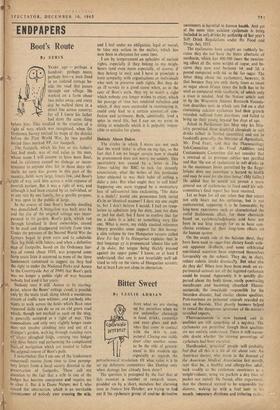ENDPAPERS
Boot's Route
By STRIX
YEARS ago — perhaps a hundred: perhaps more, perhaps less—a man lived in an isolated cottage be- side the road that passes through our village. He worked on a farm about two miles away, and every day he walked there in a direct line across country;
for all I know his father
had done the same thing before him. This resulted in the creation of a right of way, which was recognised, when the Ordnance. Survey revised its maps of the district before the First World War, by two parallel dotted lines marked FP, for footpath.
The footpath, which his feet or his father's fee1., had made, was of real value to the man, whose name I will assume to have been Boot, and, its existence caused no damage or incon- venience to anyone else; for in those days vir- luAlly no corn was grown in this part of the conntry, fields were large, fences few, and Boot's
( ,right of way took him across a wide expanse of poorish pasture. But it was a right of way, and although it had been created by an individual, or at any rate by one family,. for a specific purpose, it was open to the public. at large.
In the course of time Boot's humble dwelling was demolished. A bungalow was built near by and the site of the original cottage was incor- porated in; its garden. Boot's path, which ran through farmland in three ownerships, ceased to be used and disappeared entirely from view: Under the pressure of the Second World War the farmers began to grow corn and to subdivide t4.eir fields with fences; and when a definitive 'nap of footpaths, based on the Ordnance Sur- Vey. .of round about 1910, was prepared some forty years later it occurred to none of the three landowners concerned to suggest (as they had the right to under the National Parks and Access to the Countryside Act of 1949) that Boot's path Was no longer a public right of way because nobody had used it for years.
Nobody uses. it still. Access to its starting- Point, where the Boots' cottage stood, is possible only by the main road, along Which a murderous strewn of traffic now whizzes; and anybody who Wants to walk across the fields which Boot once traversed daily can do so on an old green road which, though not marked as such on the map, is generally accepted as a right of way. This commodious and only very slightly longer route does• not involve climbing into and out of a stranger's garden, walking through standing corn riVi':Lieross ploughed fields, crossing two hedges and tbree fences and performing the complicated tpaK,of navigation which are needed to follow the original course of Boot's path.
I nevertheless (for I am one of the landowners concerned) receive from time to time peremp- tory letters from a local society devoted to the preservation of footpaths. These call my attention to the fact that a stile in one of the hedges has become overgrown and require me to clear it. But it is Dame Nature, not I, who caused this obstruction, which is an inevitable consequence of nobody ever crossing the stile, and I feel under no obligation, legal or moral, to take any action in the matter, which has now been in abeyance for some time.
I am by temperament an upholder of ancient rights, especially if they belong to my neigh- bours (and even more especially, of course, if they belong to me); and I have in principle a keen sympathy with organisations or individuals who seek to preserve such rights. But they do an ill service to a good cause when, as in the case of Boot's path, they try to assert a right which nobody any longer wishes to enjoy, which the passage of time has rendered valueless and which, if they were successful in reanimating it, could only lead to a certain amount 1 of con- fusion and acrimony. Both, admittedly, lend a spice to rural life, but I can see no point in tilting at windmills which it is palpably impos- sible to mistake for giants.
Dubiety About Dukes
The circles in which I move are not such that the word 'duke' is often on my lips, so the fact that I am no longer certain how it should be pronounced does not worry me unduly. This uncertainty was caused by a letter in The Times taking the BBC to task for slovenly enunciation; what the writer of this particular letter objected to was their habit Of calling a duke a juke. But what ought they to call him? Supposing one were trapped by a momentary loss of self-control into exclaiming, 'The duke is a dude !,' would one pronounce both initial d's in an identical manner? I dare say one ought to, but I don't believe I would. I feel no temp- tation to substitute juty for duty, June for dune or juel for duel; but I have to confess that for me a duke is a juke, or something very like one. What is more, my richly stocked reference library provides some support for this heresy; a slim volume by two Hungarian savants called How To Say it hi Hungarian explains that in that language gy is pronounced 'almost like soft d in duke, the tongue being thickly pressed against the upper gums.' I know, or at least I understand, that one is not invariably well ad- vised to rely on the views of Hungarian savants; but at least I am not alone in aberration.






































 Previous page
Previous page